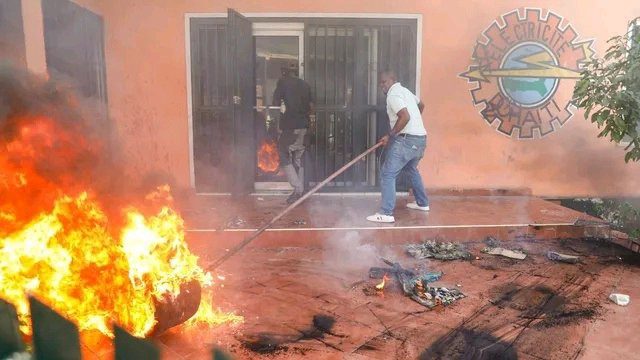Haiti’s descent into lawlessness escalates with the Interior Ministry set ablaze by gangs. The crisis highlights the urgent need for political transition.
Haiti’s descent into lawlessness took a dramatic turn as gangs, led by notorious figures, set the Interior Ministry ablaze, marking an escalation in the Caribbean nation’s ongoing crisis. This violent act, part of a broader assault on government institutions, underscores the gangs’ growing boldness and the government’s dwindling control. Key figures like gang leader Jimmy “Barbecue” Chérizier and former coup leader Guy Philippe have emerged at the forefront of this chaos, demanding the resignation of Prime Minister Ariel Henry and threatening further violence.
The Spark of Violence
In the dead of night, armed gangs launched a coordinated attack on Haiti’s Interior Ministry, setting it on fire and leaving the nation in shock. This action is the latest in a series of violent escalations that have seen police stations and a peace court torched, and the country’s largest prison breached, leading to the escape of thousands of inmates. Amidst this turmoil, the government declared a state of emergency, imposing a curfew and extending it in a bid to quell the unrest. However, these measures have so far failed to stem the tide of violence that is sweeping across Haiti.
A Cry for Political Transition
The onslaught on the Interior Ministry is not just an act of violence but a clear signal from the gangs of their intent to force political change. Leaders like Chérizier have openly threatened a civil war and genocide if their demands for Henry’s resignation are not met. The United States, observing the escalating situation, is pushing for a political transition in Haiti. Meanwhile, commercial airlines have suspended flights, and the U.S. Embassy has issued security alerts urging American citizens to leave the country immediately, highlighting the international concern over Haiti’s descent into chaos.
Implications for Haiti’s Future
This latest act of violence against Haiti’s Interior Ministry is a grim indicator of the country’s spiraling crisis. With gangs now openly challenging the government, and key international players calling for political solutions, Haiti stands at a crossroads. The potential deployment of a Marine security team by the U.S. State Department underscores the gravity of the situation. The question now is whether a political transition can quell the unrest or if the nation will continue to be torn apart by violence. As the world watches, the people of Haiti are caught in the middle, facing an uncertain future.






